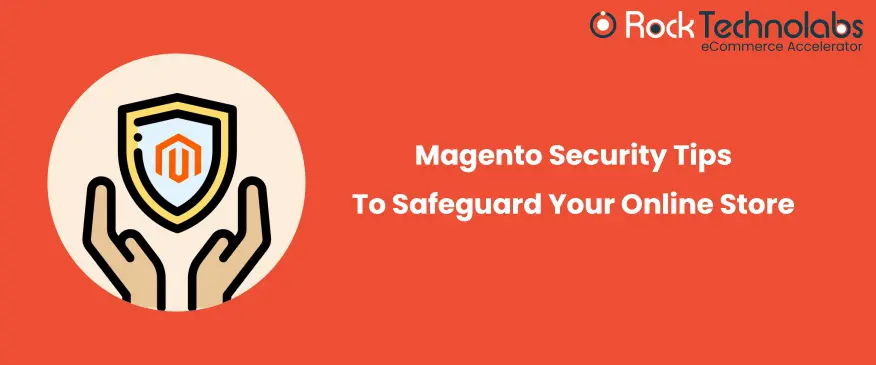Magento Security Best Practices

Are you worried about your Magento store’s security and wondering how to fix those security issues?
Are you also one of those ecommerce sellers who are constantly worried about their Magento websites’ comprehensive protection and security. If “Yes” then fix your security issues with these Magento Security Tips. We know that it’s not an easy task to find and apply the right measures for the same.
The eCommerce industry is growing rapidly and the popularity of online shopping isn’t just a passing craze but a gateway for your brand to expand. Looking at the growth of eCommerce worldwide, it might be challenging to ensure the security of your Magento commerce website from threats and cyber-attacks.
In this blog, we will comprehensively talk about Magento security best practices to protect your website data from attackers and highlight various threats related to it.
As per Astra Security Report, 62% of Magento stores have at least one Magento vulnerability. Ordinarily, attacker cracks e-commerce websites to steal your website data and use it for phishing (the attempt to receive customers’ private information such as credit card details or passwords), to harm your website, or to utilize the information for electronic spam. Thus, secure the personal information and private (financial) data of your customers using Magento Security Tips.
What is Magento security?
Do you know that Magento is one of the most popular and secure eCommerce platforms that provide built-in security features that support overcoming security risks such as illegal transactions, data leaks, information theft, and other malware attacks?
When it comes to Magento security ensure you have applied all modern practices like trusted themes, extension, and hosting, Whether you are preparing to build a Magento store or have a current one, the security of the website is important part that cannot be neglected.
Magento Security Features:
- Upgrade Magento store to the latest version
- Set a strong admin name and password
- Must use two-factor authentication
- Use reliable Magento 2 extensions
- Choose the right hosting
- Have a unique admin URL
- SSL certification
- Use reCaptcha
- Backup regularly & User firewall
- Avoid Re-using passwords on another platform
- Change your password periodically
- Avoid storing passwords on your system
- Pay special attention to any suspicious activity
Common Source Links: Adobe Security Best PracticesAdobe Magento Commerce Security Best Practices Guide
Consult Magento experts to implement the best practices recommended by them. Use the Magento security checklist and Magento mentioned security tips to keep your store safe and secure from any kind of attacks or uncertainty. Migrate to Magento 2, use strong passwords, back up your data regularly, ensure two-factor authentication, update to the latest Magento version, use reCaptcha, and use a web application firewall or WAF.
Best Practices of Magento Security To Follow:
Here are some important and useful Magento security best practices to protect your online store:
⦁ Update Magento Latest Version
Some Magento store owners forget to update their website to the latest version of Magento. Every new version comes up with specific features and fixes all the security issues so to ensure website security and high performance, it is very important to update your Magento website to the latest Magento version and keep it up to date.
You can ask Magento experts to identify and fix known security issues and also introduce you to the new security features to make the website safer and more robust.
Explore: Magento 2.4.4 is Out Now!
⦁ Use reCAPTCHA
Magento 2 reCAPTCHA is the best option and a foolproof way to protect your website from fraud, abuse, and attackers. It helps in blocking the access of spambots and keeping your website safe & secure from attackers. Recaptcha helps to ensure genuine site logins by determining if the login or access session on your website is done by a bot or a human.
It’s hard for bots to read or solve ReCaptcha, easy for humans to solve, but hard for “bots” to read or solve, and difficult for other malicious software to figure out. Most website owners use reCAPTCHA to differentiate bots from humans with an image challenge and to defend their website against attacks.
⦁ Implement Two-Factor Authentication
One of the best ways to enhance Magento store security is none another than Two-Factor Authentication. Make sure that your Magento eCommerce store is implemented with this, as it provides an extra layer of website security to make it impossible for hackers and attackers to attack or target your Magento store.
This security option comes with different two-factor authentication methods like Duo Security, Authy, Google authenticator, and much more.
⦁ Backup Regularly
Regular backup prevents data loss, so if you are one of those sellers who don’t back up your Magento website, then start doing it now regularly. Because if you have a website backup in your hand then incase if something got missing, you can use your backup to restore all the crucial data automatically.
Don’t use the same device to hold the backup copies because if an attacker gained access to your server then it might be possible that he can access your backup. You can afford to lose website and back data both.
If your server crashes, your backup copies can also be lost or corrupted. For website backup, you can use built-in backup functionalities, binary tools, or other recommended technologies. Configure the cron jobs on your server to back up the database or the file system at regular intervals. Upload data to remote servers for additional security purposes.
⦁ Get an Encrypted Connection (SSL/HTTPS)
Unencrypted connections or unauthorized connections are one of the biggest reasons for security breaches. To avoid such security breaches easily, you can use a secure Magento connection. Getting HTTPS/SSL is not a tough task if you are already using Magento.
Follow the below points:
- Search the tab “Use Safe URLs” in the device setup menu to get a secure HTTPS/SSL URL in Magento.
- Get an SSL certificate using the Let’s Encrypt section. Having an SSL certificate is one of the key aspects of ensuring that your online purchases are secure and your website is PCI-compliant.
⦁ Use Secure and Strong Passwords
Never set simple and obvious passwords like birthdates, names as these can be easily accessed and hacked. People who are not good at remembering passwords or forget their passwords easily, they always try to keep the simple passwords that can be remembered easily. But believe us, it is not the smartest move as it can be accessed easily.
Always try to use a complex and secure password to prevent unauthorized access to your account. Such complex passwords can be a combination of numbers, alphabets, lower case, upper case, symbols, etc.
⦁ Use a Unique URL for Admin Dashboard
Magento comes with a default admin URL “my-site.com/admin”, and this can be identified and accessed easily by anyone. It is important to set a custom path or unique URL to secure your admin panel for your Magento store.
Use a custom word at the place of /admin, and this custom word can be anything related to your website requirement. This custom word cannot be easily identified and helps to stop hackers from accessing the admin login page of your Magento store even if hackers get their hands on your password.
⦁ Utilize Firewall to Stop MySQL Injection
Use a web application firewall (WAF) or Network firewall for an additional layer of security to a website. WAF analyses, track, and filters the web traffic for suspicious patterns and before it reaches your server, WAF will stop the malicious traffic before that.
To block any newly discovered threats and to safeguard your website against hacking and cyberattacks, you can update the WAFs in real-time. Also, adding a WAF to your Magento website will not only protect your store from security vulnerabilities but also protect it from сross-site scripting attacks and complex SQL injection attacks.
We know that Magento helps to prevent MySQL injection but for better security, you can implement a firewall application to defend your websites against such security breaches and attacks.
⦁ Pay Special Attention To Any Suspicious Activity
Keep tracking your website on regular basis and if you identify any suspicious activity, take a step to report and solve that on time. You can conduct a security review to check for any signs of a security breach or attack. To check suspicious activity in your Magento store, you should use the right Magento extensions. You can also use Magento Security Scan Tool offered by Adobe to check and monitor your store regularly for any unauthorized access and other security threats.
⦁ Select the right solution integrator and extension vendors
While googling for “Solution Integrator (SI)” you may end up landing with thousands of search results. And the biggest challenge is to identify the ideal solution that has:
- Distinct services
- Extension which is very well versed in security point of view with a strong track record of dealing with issues related to Magento security
- Proven to have secure coding practices for customizations
- A modern strategy that suits your business needs as well.
So customers have to choose the extensions wisely. Make sure to use those extensions which are tested and verified to perform well. Additionally, keeping your Magento extensions up to date is also very important to maintain current security standards. To select the most appropriate and secure extensions, you can also consult the chosen solution integrator. But first, do your research thoroughly and choose the right consulting team to protect and safeguard your business.
Consider the following pointers recommended by Adobe when selecting Magento extensions:
- Most important is to choose and source the extension through the solution integrator or from the Magento Marketplace.
- Ensure ownership of the extension license is transferrable or not if you have sourced the extension through the solution integrator because it will be required in case the integrator changes.
- In order to reduce risk exposure, restrict the limit to add the number of extensions and vendors.
- Before integrating an extension, review the extension code or security if possible.
Protecting Your Magento Store Should be the Priority Now:
Tada! Here we have listed Magento 2 security best practices to protect your Magento store from attackers. Scan your Magento website at regular intervals to ensure that everything is in place and your site runs smoothly.
In case you require any kind of assistance, you can always reach out to Rock Technolabs. We’d be glad to perform an initial review and security assessment of your website to evaluate the protection standard, identify any loopholes, get a detailed report on risk factors and help you to fix them.





